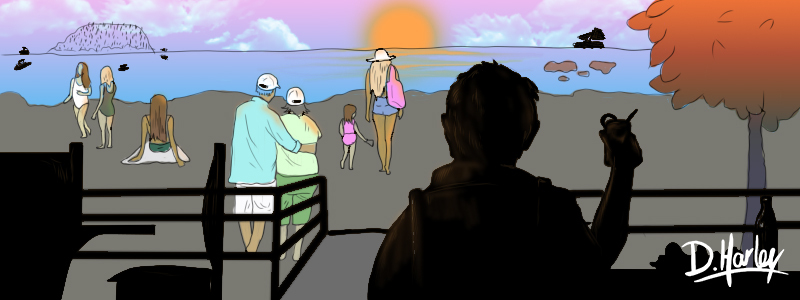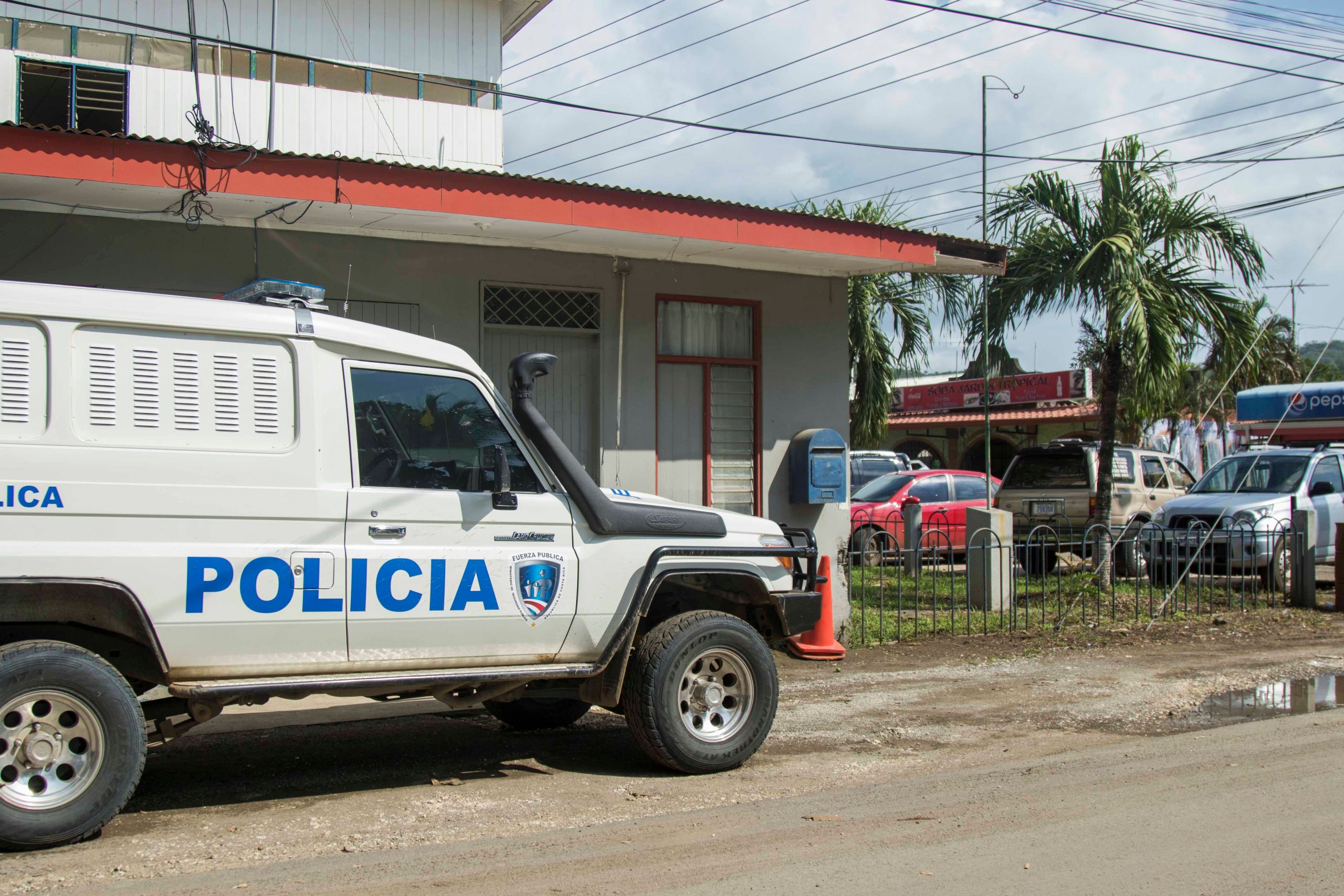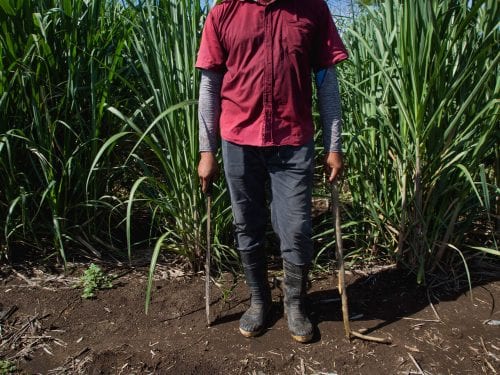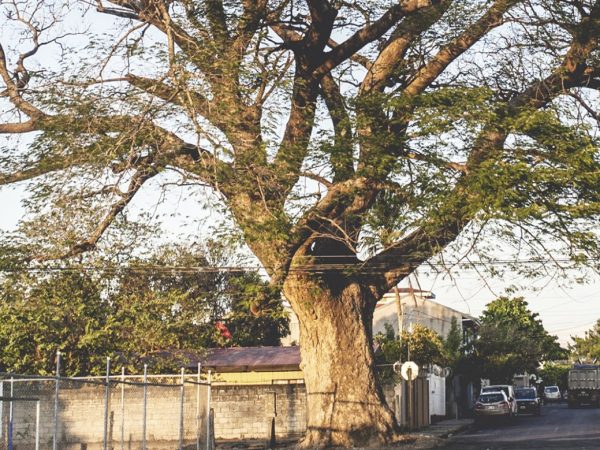
On the evening of Sunday, September 5, a Costa Rican tourist was vacationing in El Coco, in the canton of Carrillo, when she overheard a foreigner asking a restaurant waiter to help him “get little girls.”
“What I did first was take photos of him out of fear that he’d get angry and leave and I wouldn’t have evidence of who he was,” Cynthia Castro, a businesswoman and psychologist, told The Voice. She was alarmed at the possibility that the foreigner would sexually exploit girls. “I asked if he was a regular customer in the restaurant, but they said no. We told them what we had heard and they were concerned. “
Castro approached the man and told him that she had understood what he was looking for, that it was illegal, and that she would file a complaint at the police station. According to Castro’s account, the foreigner first tried to imply that there was a misunderstanding, but then he got upset and told her to mind her own f”””ing business.
Castro’s persistence in denouncing the case and the actions taken by the community made the foreigner leave even earlier than he had planned.
Interagency Alarm
Sex trafficking is a crime under article 172 of the penal code, which is punishable by six to 10 years of imprisonment if the victim is an adult and eight to 16 years when the victim is a minor. “In no case will consent granted by the victim exempt [the person] from criminal responsibility,” the penal code specifies.
Castro filed a complaint at the El Coco police station on the same day that she confronted the foreigner, with photographs of him. Later, she also filed complaints with the Judicial Investigation Agency (OIJ), the company that rented a car to the foreigner and at the accommodation— from Airbnb— where he was staying, all with the help of people from El Coco.
A community resident indicated on a Facebook group that a neighbor also went to the police to accuse him because she saw him offering money to two girls. In the same group, another woman wrote that the foreigner gave pencils to her daughter in Langosta.
According to Castro, the police contacted her on Monday, the day after she filed her complaint, to tell her that the night before they had run into the foreigner with prostitutes of legal age and that they warned him about the complaint. The Voice tried to contact the police chief for the El Coco delegation, Jeffrey Jimenez, but by the deadline for this article, he hadn’t responded.
Following the complaint filed with OIJ, investigators from Santa Cruz went to the place where he was staying on Tuesday, September 7, but he was no longer there.
Faced with the situation, a lawyer who lives in the El Coco community, Priscilla Solano, managed to contact the administrator of the condominium where the foreigner was staying. “The one who manages it contacted the owner of the house and told him that he wanted him to leave [the condominium] because of the situation that arose. He at once called him and invited him to leave, and the foreigner left the next day,” said Solano.
According to the lawyer who stayed in contact with people at the condominium, the foreigner had rented the apartment through Airbnb until September 15, but he left earlier.
Budget Rent a Car, which rented him a vehicle, was also aware of the case and had their code of conduct against child and adolescent sexual exploitation active, a project coordinated by the Costa Rican Tourism Institute (ICT).
The manager of the car rental company, Paulo Vargas, told The Voice via email that they had been notified of the complaint filed against an alleged client, “which is why we are awaiting the resolution of the complaint in question from the judicial authorities in order to be able to take measures if necessary.”
“We agree that the incidents mentioned in the complaint are serious. However, for the moment, we can’t issue a value judgment until we have knowledge of the scope of the judicial resolution out of respect for the alleged victim,” added Vargas.
ICT manager Alberto Lopez pointed out that the case highlights the validity and necessity of the code against exploitation. “Fortunately, there were people like Cynthia around, who caused everything positive when she heard him, like filing the complaint and having a lawyer advise the place where he was staying to get him out,” he added.
“I want to believe that this person left very ashamed and is not coming back,” he added. “That is not tourism. He is motivated by something else and does tourism, but he doesn’t contribute anything to the country other than moral damage and terrible harm,” he added.
With the code, businesses commit to actions to combat child sexual exploitation, such as receiving training, posting messages against sexual exploitation, canceling a person’s stay, or asking them to leave a restaurant if they find out that exploitation situations might be occurring. Above all, they commit to reporting any crime or insinuation associated with the sexual exploitation of children.
The lawyer, Priscilla Solano, pointed out the need for these initiatives to transcend new ways of doing tourism, for example, for the code to be extended to owners of rental places on the Airbnb platform.
As a result of the case, ICT began planning training for the tourism sector on the Carrillo coast. “We’re going to have an awareness-raising presence in the area. I’m going to try to get Priscilla, the lawyer, and Cynthia to be able to tell people what they did and the brave action they took in reporting,” said Lopez. “We have to go to the area to have contact with business owners and make them feel that we support them.”
Solano and Cynthia emphasized the importance of community action. “He moved up his departure because he felt the sourness that the community was looking for him, upset and uncomfortable. When we become active as a community and work together with the institutions, we can prevent crimes and word will spread among their peers that they are not welcome in these areas,” she pointed out.
Castro reaffirmed this on social networks. “It has been an experience that has shown that reporting is worthwhile and that there are many advantages that Costa Rica is a small country and that everyone knows each other, because when people want to and care, we have a lot of power to stop people like him,” she said.
Through an Involved Tourism
The code is currently coordinated by ICT, but it was an initiative promoted in Costa Rica by the Paniamor Foundation and worldwide by ECPAT International— a global network of organizations against child exploitation— and the World Tourism Organization.
“When the second world congress against child sexual exploitation was held, the countries were called on not only to focus on attending to the victims but also to address the offenders, because nothing was being done with that,” recalled Paniamor’s director of Strategy and Innovation, Milena Grillo.
“At that time, Costa Rica was identified as a destination for what was previously called sex tourism. [Now it’s directly called child sexual exploitation.] We started to touch on the subject and at first, colleagues at ICT didn’t express much interest because there was concern that the country’s image would be affected,” said Grillo.
The organization, in alliance with others involved in tourism, began to visit tourism areas to explain the problem. “Whenever we went to Guanacaste, we would talk to the [tourism] sector and they would say that this didn’t exist,” Grillo recalled, “but when we began to explain, they did understand what it was about, because at first people don’t identify it as it really is.”
To Grillo, it was gratifying to see the response that was triggered throughout the tourism sector by the complaint filed by businesswoman and psychologist Cynthia Castro. “We have to educate foreigners and warn them that this is a crime and that there is an active society that reports it if this happens.”
Currently, 409 tourism businesses nationwide adhere to the code of conduct.

Illustration: Dunkan Harley
Coastal Areas and their Vulnerability
According to the latest Trafficking in Persons Report for Costa Rica, from the U.S. Department of State, “those living in the Pacific coastal zones and near the northern and southern borders [are] particularly vulnerable” in the country. The report also notes that visitors who commit these crimes tend to be mostly from the United States and Europe.
The report, published in June of 2021, specifies that according to data from the Prosecutor’s Office, during 2020, they investigated 103 trafficking situations, 28 of which were cases of child sex trafficking.
Grillo, from Paniamor, emphasized the need to recognize that it’s not just foreigners who commit these crimes. “We as Costa Ricans have a tendency to think that everything that isn’t good that happens to us comes from outside. There are a range from ordinary basic family organizations or boyfriends that market their partners to things that are already very organized that bring people here,” she explained.
She also reiterated the importance of activating alerts even more so in contexts such as the current one, when families and communities see their economic and social capacities diminished. “We have the risk that sexual exploitation will emerge as a way to generate income. We need to redouble our efforts to be on the watch, and this situation is exactly what we want to see happen: ethical citizens who observe and do everything that this person did. And we want to see all parties responding,” she stressed.
What can we do if cases like this are suspected?
One of the main points that the National Coalition for Trafficking and Smuggling of Persons (CONATT) has warned about on previous occasions and that Grillo emphasized is that no one has to be completely certain of what crime occurs in order to report it.
“We don’t have to be certain. OIJ and the authorities are in charge of that. We see and report, and it’s up to colleagues in the Judiciary to build certainty,” she said.
And she related an example of a situation that they noticed in a canton of Guanacaste. “We arrived in a community and mapped trafficking routes. When we started to talk, the information that people in the community, health, and education had was surprising. They said that every Friday, a white van would arrive and take the girls and they wouldn’t return until Monday. The whole community saw it and nobody did anything,” she lamented.
That’s why she insists on the co-responsibility that each and every one of us protect children and adolescents. “We need to have a well-intentioned view that is clear that the responsibility for taking care of girls, boys and adolescents is shared. Of course, the family should be first in protecting, but the State and each and every one of us must do so as well.”
Some actions to combat child sexual exploitation are:
- Businesses can adhere to the code of conduct against child sexual exploitation coordinated by ICT.
- Citizens need to report suspected cases at the nearest police station.
- Hotlines that deal with specific cases of trafficking and human smuggling are 2290-2703 / 2290-2723 / 2290-2734 or e-mail [email protected]
- You can also report to OIJ by calling 800-8000-645 or via WhatsApp at 8800-0645.
- Promote and coordinate inter-institutional and community strategies to address situations of child sexual exploitation.
Some signs that indicate that there might be a situation of child sexual exploitation are:
- There’s a difference in the appearance of the adult and that of the minor (physical appearance and way of dressing).
- The adult and the minor don’t talk or show signs of kinship or affection.
- The minor keeps a distance from the adult.
- The people seem nervous (voice, face, hands).
- There is no interaction between them.
- The adult is the one leading the conversation.
- They don’t speak the same language or have different accents.
- Instead of looking nervous, they might seem “very comfortable” with the situation and act very normal.
Source: Informative guide for tourism businesses to take action, ICT and Paniamor.







Comments